★★½
Lady Snowblood
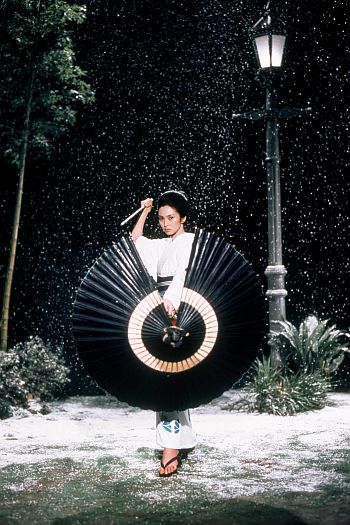 I’ll be honest: I was disappointed. I’d been looking forward to seeing this for a long while, but when we finally cranked it up on Monday, found it pretty dull. Truth be told, Chris was giving it loud Z’s by the end of the film, and I spent a few minutes closing my eyes and just listening to the dialogue. Which, since it was in Japanese, isn’t a good sign either. This was a surprise. A lot of people, whose views I generally respect, really like it, such as mandiapple.com, who called it “nothing short of a masterpiece.” Reading that, I had to check they were reviewing the same film. Because, personally, while its influence on Kill Bill is undeniable, that is a far more effective piece of work.
I’ll be honest: I was disappointed. I’d been looking forward to seeing this for a long while, but when we finally cranked it up on Monday, found it pretty dull. Truth be told, Chris was giving it loud Z’s by the end of the film, and I spent a few minutes closing my eyes and just listening to the dialogue. Which, since it was in Japanese, isn’t a good sign either. This was a surprise. A lot of people, whose views I generally respect, really like it, such as mandiapple.com, who called it “nothing short of a masterpiece.” Reading that, I had to check they were reviewing the same film. Because, personally, while its influence on Kill Bill is undeniable, that is a far more effective piece of work.
The plot in both is needlessly-convoluted, but it has much more of a negative impact here. Here is the story, in chronological order. In late 19th-century Japan, a mother sees her husband and young son slaughtered by a group of four con-artists; she is kidnapped and raped over a period of several days before being abandoned. She vows revenge, but is arrested after killing only one of the four, and sent to prison for life. There, she has a baby daughter, Yuki, spawned for the sole purpose of continuing the revenge. After the mother dies in jail, Yuki is released with another prisoner, and begins her training under a tough Buddhist priest (Nishimura). When she reaches her twentieth birthday, she leaves, to start her mission.
The problems here are multiple, not least that Yuki is just too cold. She might as well be an automaton, as she progresses on her vengeance, showing no emotion or feeling, and it’s hard to feel empathy for her. Yes, she is supposed to be a cold-hearted killing machine, but the performance here is devoid of all humanity. There’s nothing personal here either. Yuki is not the victim; the events in question occurred before she was even conceived, giving her no direct stake in proceedings – she is simply a tool, wielded from beyond the grave by a mother she never really knew. Contrast Kill Bill, where the Bride sees her husband-to-be slaughtered at the altar. As motivation, it’s far superior and resonates much more with the audience.
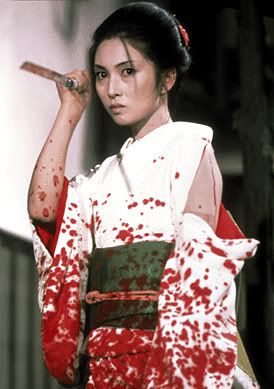 Then there’s the action, which is second-rate at best. It may have seemed cutting-edge when the film was released in 1973. Approaching forty years later… Not so much. There’s little sense that anyone – good or bad – has true sword skills, and the battles are largely brief and perfunctory. Admittedly, the arterial spray is enthusiastic – clearly the high blood-pressure epidemic affecting Japan is not a new phenomena – and looks very pretty on the snow backdrop which is frequently used. However, that can only go some way to overcoming the flaws in the characterization: one suspects the original manga, by Kazuo Koike (who also did Lone Wolf and Cub), perhaps had more room to be better developed in this area. And while we’re at it, what’s with the anachronistic jazz soundtrack, dating from a good half-century after this is set? Any sense of period atmosphere is completely destroyed, every time it cranks up.
Then there’s the action, which is second-rate at best. It may have seemed cutting-edge when the film was released in 1973. Approaching forty years later… Not so much. There’s little sense that anyone – good or bad – has true sword skills, and the battles are largely brief and perfunctory. Admittedly, the arterial spray is enthusiastic – clearly the high blood-pressure epidemic affecting Japan is not a new phenomena – and looks very pretty on the snow backdrop which is frequently used. However, that can only go some way to overcoming the flaws in the characterization: one suspects the original manga, by Kazuo Koike (who also did Lone Wolf and Cub), perhaps had more room to be better developed in this area. And while we’re at it, what’s with the anachronistic jazz soundtrack, dating from a good half-century after this is set? Any sense of period atmosphere is completely destroyed, every time it cranks up.
What works is mostly the visual style, and it’s soundly put together from a technical aspect. Kaji, who plays the adult Yuki, is also solid enough, though was probably better – even if she said less! – in the Female Convict Scorpion series [I must get round to reviewing the excellent Jailhouse 41 here some time, though it won’t be till after we move house in October, and the DVD re-surfaces…]. I also liked the chaste purity here: Yuki doesn’t have any real relationships at all – she lives purely for revenge. However, I feel much the same way about this, that I did about the original Night of the Living Dead. While it certainly deserves to be respected for its influential place in the history of the genre, it feels as if the elements seen here have been revisited with greater success, by those who followed in its foot-steps.
Dir: Toshiya Fujita
Star: Meiko Kaji, Ko Nishimura, Toshio Kurosawa, Masaaki Daimon
★★
Lady Snowblood 2: Love Song of Vengeance
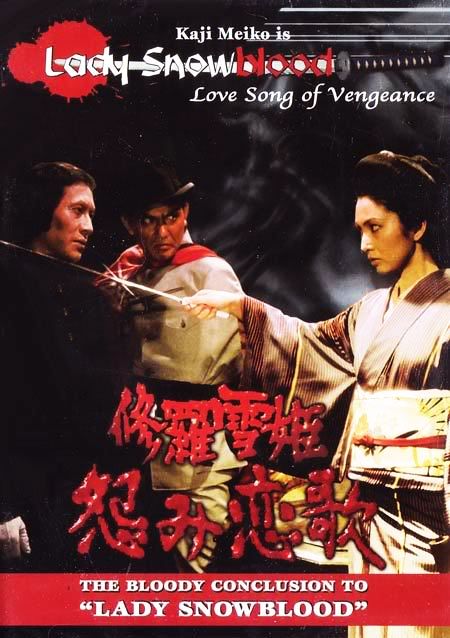 I was hoping that the second film would show me why this series has such a solid reputation, but was even more disappointed by the sequel than the original. There’s a striking opening, where Yuki basically walks out of an ambush, hardly bothering even to pay attention to the men circling her – except to slaughter them. Unfortunately, it’s pretty much downhill from there, with proceedings getting badly bogged down in even more of the political shenanigans that we saw in part one. Yuki is arrested and sentenced to death for her 37(!) murders, but is rescued by the chief of the secret police, Kikui Seishiro (Kishida), who sends her on a mission against nihilist Ransui Tokunaga (Itami), perceived as a threat to the order of things.
I was hoping that the second film would show me why this series has such a solid reputation, but was even more disappointed by the sequel than the original. There’s a striking opening, where Yuki basically walks out of an ambush, hardly bothering even to pay attention to the men circling her – except to slaughter them. Unfortunately, it’s pretty much downhill from there, with proceedings getting badly bogged down in even more of the political shenanigans that we saw in part one. Yuki is arrested and sentenced to death for her 37(!) murders, but is rescued by the chief of the secret police, Kikui Seishiro (Kishida), who sends her on a mission against nihilist Ransui Tokunaga (Itami), perceived as a threat to the order of things.
That’s because Tokanaga and his wife are in possession of a document that could seriously embarrass the government, by proving their involvement in the deaths of Tokunaga’s partners. When Yuki discovers this, she switches sides, though Tokunaga is arrested, tortured and, when he fails to give up the document’s location, injected with bubonic plague [interestingly, this is a decade before the biological weapons work of Unit 731 during WW2 became public knowledge in Japan] and dumped in the slums as a warning to others. Yuki teams up with Tokunaga’s estranged brother, and sets out to take revenge on the government forces responsible for his death.
This is set just after the Russo-Japanese war of 1905, and I’ve a feeling is meant in some way to parallel the political situation of the 1970’s. However, all such sentiment is entirely wasted on Western viewers watching it almost forty years after it was made. If you’re looking at this as an action movie, it plays out in a manner best described as turgid, with very sporadic action, to such an extent that it hardly qualifies as such at all – if it weren’t for the original, I doubt I’d be covering it here. Even the arterial gushiness seems to be less unenthusiastic and sprayful than previously.
On the other hand, Kaji’s portrayal is more emotionally-disengaged this time, and it’s even harder to develop sympathy for a character engaged in some kind of obscure political activism, rather than personal revenge. It’s what perhaps makes this one’s closest cousin V For Vendetta, with samurai swords. And, in case you were wondering, that is not meant to be much of an endorsement. I’d say you are far better off watching the futuristic remake, The Princess Blade or even the better entries in the Crimson Bat series than either of these films, and given my high hopes coming into these, based on their reputation, that’s extremely disappointing.
Dir: Toshiya Fujita
Star: Meiko Kaji, Juzo Itami, Kazuko Yoshiyuki, Shin Kishida
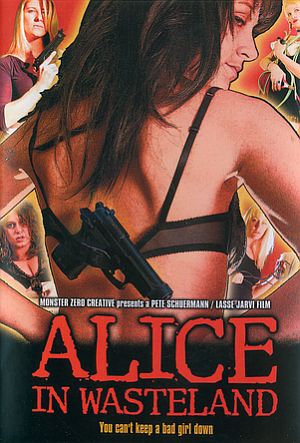 Ok, that brief is a little harsh, but it is true to say by the end, I had opted to double-task, and was watching this while I stood over the sink in the kitchen. It wasn’t as good as I expected: I was hoping for something along the lines of Faster, Pussycat, and instead got a turgid, over-extended crime drama. While it has all the right aspirations, the yawning chasm between that and its execution would require several days’ trip by mule to cross. Alice Wynn (Sondrup) is part of an armored-truck robbery, only to find herself double-crossed and left for dead by corrupt cop Jill Robbe (Beisner). Alice vows to recover the loot and take revenge on Robbe, and won’t let anyone – examples include her late mother’s boyfriend, psychotic pimp Ramrod or his Swedish assassin – stand in her way.
Ok, that brief is a little harsh, but it is true to say by the end, I had opted to double-task, and was watching this while I stood over the sink in the kitchen. It wasn’t as good as I expected: I was hoping for something along the lines of Faster, Pussycat, and instead got a turgid, over-extended crime drama. While it has all the right aspirations, the yawning chasm between that and its execution would require several days’ trip by mule to cross. Alice Wynn (Sondrup) is part of an armored-truck robbery, only to find herself double-crossed and left for dead by corrupt cop Jill Robbe (Beisner). Alice vows to recover the loot and take revenge on Robbe, and won’t let anyone – examples include her late mother’s boyfriend, psychotic pimp Ramrod or his Swedish assassin – stand in her way.




 I’ll be honest: I was disappointed. I’d been looking forward to seeing this for a long while, but when we finally cranked it up on Monday, found it pretty dull. Truth be told, Chris was giving it loud Z’s by the end of the film, and I spent a few minutes closing my eyes and just listening to the dialogue. Which, since it was in Japanese, isn’t a good sign either. This was a surprise. A lot of people, whose views I generally respect, really like it, such as
I’ll be honest: I was disappointed. I’d been looking forward to seeing this for a long while, but when we finally cranked it up on Monday, found it pretty dull. Truth be told, Chris was giving it loud Z’s by the end of the film, and I spent a few minutes closing my eyes and just listening to the dialogue. Which, since it was in Japanese, isn’t a good sign either. This was a surprise. A lot of people, whose views I generally respect, really like it, such as  Then there’s the action, which is second-rate at best. It may have seemed cutting-edge when the film was released in 1973. Approaching forty years later… Not so much. There’s little sense that anyone – good or bad – has true sword skills, and the battles are largely brief and perfunctory. Admittedly, the arterial spray is enthusiastic – clearly the high blood-pressure epidemic affecting Japan is not a new phenomena – and looks very pretty on the snow backdrop which is frequently used. However, that can only go some way to overcoming the flaws in the characterization: one suspects the original manga, by Kazuo Koike (who also did Lone Wolf and Cub), perhaps had more room to be better developed in this area. And while we’re at it, what’s with the anachronistic jazz soundtrack, dating from a good half-century after this is set? Any sense of period atmosphere is completely destroyed, every time it cranks up.
Then there’s the action, which is second-rate at best. It may have seemed cutting-edge when the film was released in 1973. Approaching forty years later… Not so much. There’s little sense that anyone – good or bad – has true sword skills, and the battles are largely brief and perfunctory. Admittedly, the arterial spray is enthusiastic – clearly the high blood-pressure epidemic affecting Japan is not a new phenomena – and looks very pretty on the snow backdrop which is frequently used. However, that can only go some way to overcoming the flaws in the characterization: one suspects the original manga, by Kazuo Koike (who also did Lone Wolf and Cub), perhaps had more room to be better developed in this area. And while we’re at it, what’s with the anachronistic jazz soundtrack, dating from a good half-century after this is set? Any sense of period atmosphere is completely destroyed, every time it cranks up. I was hoping that the second film would show me why this series has such a solid reputation, but was even more disappointed by the sequel than the original. There’s a striking opening, where Yuki basically walks out of an ambush, hardly bothering even to pay attention to the men circling her – except to slaughter them. Unfortunately, it’s pretty much downhill from there, with proceedings getting badly bogged down in even more of the political shenanigans that we saw in part one. Yuki is arrested and sentenced to death for her 37(!) murders, but is rescued by the chief of the secret police, Kikui Seishiro (Kishida), who sends her on a mission against nihilist Ransui Tokunaga (Itami), perceived as a threat to the order of things.
I was hoping that the second film would show me why this series has such a solid reputation, but was even more disappointed by the sequel than the original. There’s a striking opening, where Yuki basically walks out of an ambush, hardly bothering even to pay attention to the men circling her – except to slaughter them. Unfortunately, it’s pretty much downhill from there, with proceedings getting badly bogged down in even more of the political shenanigans that we saw in part one. Yuki is arrested and sentenced to death for her 37(!) murders, but is rescued by the chief of the secret police, Kikui Seishiro (Kishida), who sends her on a mission against nihilist Ransui Tokunaga (Itami), perceived as a threat to the order of things.
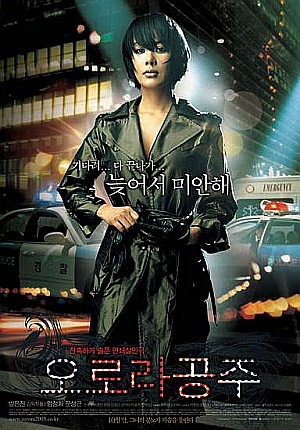 After inflicting Forbidden Warrior on Chris, my stock with her had slumped like Morgan Stanley. Fortunately, this Korean serial-killer flick provided a good measure of redemption. It stars in a department store, where Sun-Jung (Uhm) sees a mother abusing her young daughter, before leaving her and going into a stall. Sun-Jung shepherds the girl outside, breaks into the stall and stabs the mother repeatedly. The case is investigated by Detective Oh (Mun), who spots his ex-wife in the store security video. When bodies keep turning up, though killed in different ways, the police link the cases due to the cartoon stickers found on each scene. Oh gradually comes to suspect his wife is taking revenge on those holds she responsible – directly, or otherwise – for the death of their child, killed in a brutal kidnapping previously. Is that really the case, and if so, does he have the moral fortitude to turn in a woman he still loves as a murderer?
After inflicting Forbidden Warrior on Chris, my stock with her had slumped like Morgan Stanley. Fortunately, this Korean serial-killer flick provided a good measure of redemption. It stars in a department store, where Sun-Jung (Uhm) sees a mother abusing her young daughter, before leaving her and going into a stall. Sun-Jung shepherds the girl outside, breaks into the stall and stabs the mother repeatedly. The case is investigated by Detective Oh (Mun), who spots his ex-wife in the store security video. When bodies keep turning up, though killed in different ways, the police link the cases due to the cartoon stickers found on each scene. Oh gradually comes to suspect his wife is taking revenge on those holds she responsible – directly, or otherwise – for the death of their child, killed in a brutal kidnapping previously. Is that really the case, and if so, does he have the moral fortitude to turn in a woman he still loves as a murderer?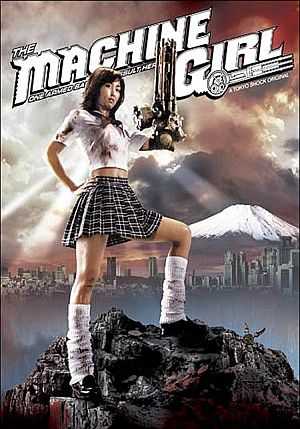
 If you enjoyed Planet Terror, you’ll likely get a kick out of this, which also combines elements of The Evil Dead, Kill Bill and Tetsuo the Iron Man into what has got to be the bloodiest movie of 2008. The life of Ami (Yashiro) is turned upside down when her brother and his friend are killed by school bullies under the control of a local gangster’s son (Nishihara). Ami sets out for revenge on all those responsible for the killings. But the Yakuza don’t take kindly to this and Ami finds herself with a count of functioning limbs that ends at three. Does that stop her? Of course not. Teaming up with the late friend’s mother Miki (Asami), whose husband happens to be an ace mechanic, Ami gets fitted with a machine-gun and the pair of vengeful vixens head off for a return match.
If you enjoyed Planet Terror, you’ll likely get a kick out of this, which also combines elements of The Evil Dead, Kill Bill and Tetsuo the Iron Man into what has got to be the bloodiest movie of 2008. The life of Ami (Yashiro) is turned upside down when her brother and his friend are killed by school bullies under the control of a local gangster’s son (Nishihara). Ami sets out for revenge on all those responsible for the killings. But the Yakuza don’t take kindly to this and Ami finds herself with a count of functioning limbs that ends at three. Does that stop her? Of course not. Teaming up with the late friend’s mother Miki (Asami), whose husband happens to be an ace mechanic, Ami gets fitted with a machine-gun and the pair of vengeful vixens head off for a return match.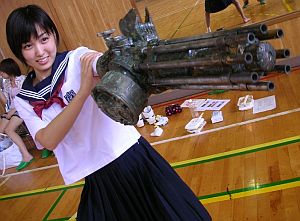 Yashiro’s background is in…well, what could politely be described as ‘bikini videos’, not action movies, but her performance here is respectable enough. Probably more impressive are Asami, and Honoka, who plays the wife of the Yakuza boss. They both, too, come from the adult industry, possessing an impressive feral intensity which reminded me of Brigitte Lahaie in Fascination, and is entirely in keeping with the grindhouse feel of the entire enterprise. You could argue that the trailer contains everything you need to see, in a more concentrated form, and I wouldn’t argue with that, or if you said this was no more than a porn variant, where nothing matters except the money shots of body fluids getting sprayed everywhere. Still, we had a blast, and the film fully lives up to the sleeve description, delivering the “One-Armed Ballistic Assault Heroine” it promises, in spades.
Yashiro’s background is in…well, what could politely be described as ‘bikini videos’, not action movies, but her performance here is respectable enough. Probably more impressive are Asami, and Honoka, who plays the wife of the Yakuza boss. They both, too, come from the adult industry, possessing an impressive feral intensity which reminded me of Brigitte Lahaie in Fascination, and is entirely in keeping with the grindhouse feel of the entire enterprise. You could argue that the trailer contains everything you need to see, in a more concentrated form, and I wouldn’t argue with that, or if you said this was no more than a porn variant, where nothing matters except the money shots of body fluids getting sprayed everywhere. Still, we had a blast, and the film fully lives up to the sleeve description, delivering the “One-Armed Ballistic Assault Heroine” it promises, in spades.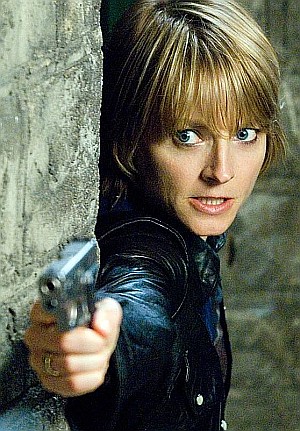 Erica (Foster) has a very comfortable life: nice job as a radio host, imminent marriage to a doctor. This is suddenly destroyed in minutes, when she and her fiance (Andrews) are brutally attacked: he is killed, and she is left a nervous wreck, who sees a threat in every shadow on the city streets. A move to Kansas, while probably better for all concerned, would not be so cinematically or narratively interesting: instead, she buys a black-market gun for protection. A chance encounter on the subway unleashes her inner Bernhard Goetz and before you know it, she’s sweeping the scum off the streets, up to and including the crime lord whom even Detective Mercer (Howard) cannot touch, while simultaneously documenting the city’s reaction to her exploits on the airwaves. This brings her into contact with Mercer, since he is also investigating the vigilante slayings; his suspicions in this area gradually turn towards his new friend.
Erica (Foster) has a very comfortable life: nice job as a radio host, imminent marriage to a doctor. This is suddenly destroyed in minutes, when she and her fiance (Andrews) are brutally attacked: he is killed, and she is left a nervous wreck, who sees a threat in every shadow on the city streets. A move to Kansas, while probably better for all concerned, would not be so cinematically or narratively interesting: instead, she buys a black-market gun for protection. A chance encounter on the subway unleashes her inner Bernhard Goetz and before you know it, she’s sweeping the scum off the streets, up to and including the crime lord whom even Detective Mercer (Howard) cannot touch, while simultaneously documenting the city’s reaction to her exploits on the airwaves. This brings her into contact with Mercer, since he is also investigating the vigilante slayings; his suspicions in this area gradually turn towards his new friend. Let’s start off by giving us a heroine who is dying, thanks to an inoperable brain tumour. Way to bring me down, Juncture: what do you think this is? DamesWithDiseases.com? The Hallmark channel is tha…oh, hang on. She’s following a child-porn purchaser back to his house, and guns him down? Hmmm. This is clearly not your everyday Illness of the Week flick. For Anna Carter (Blackport) has decided to go out with a bang: several of them, in fact. Realising she only has a short time to live, she decides to extend her day-job as the co-ordinator for a charitable foundation, and correct the failings of a justice system: neglectful mothers, drunk drivers, selfish CEOs, they’re all likely to meet impeccably-dressed vengeance.
Let’s start off by giving us a heroine who is dying, thanks to an inoperable brain tumour. Way to bring me down, Juncture: what do you think this is? DamesWithDiseases.com? The Hallmark channel is tha…oh, hang on. She’s following a child-porn purchaser back to his house, and guns him down? Hmmm. This is clearly not your everyday Illness of the Week flick. For Anna Carter (Blackport) has decided to go out with a bang: several of them, in fact. Realising she only has a short time to live, she decides to extend her day-job as the co-ordinator for a charitable foundation, and correct the failings of a justice system: neglectful mothers, drunk drivers, selfish CEOs, they’re all likely to meet impeccably-dressed vengeance.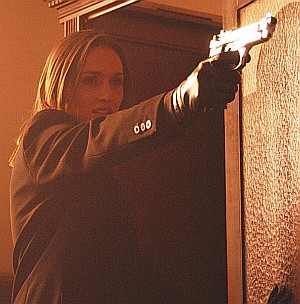 Still, there’s a great deal to admire here, with every penny being squeezed out of the budget. Particular kudos to cinematographer Richard Lerner and composer Neal Acree, whose efforts enhance proceedings significantly – the results look to be the product of a significantly-higher budget, than the rumoured million dollars. It leaves you questioning what you would do in the same situation: follow Queen Latifah off on a Last Holiday, or head for the dark side, as Anna does here, with a mission for what you perceive as the ‘greater good’? Certainly more thought-provoking than usual, it’s intended as the first part on a trilogy, though stands fairly well on its own, I would be very interested to see how things proceed from here, as Anna heads towards closure, both personal and medical.
Still, there’s a great deal to admire here, with every penny being squeezed out of the budget. Particular kudos to cinematographer Richard Lerner and composer Neal Acree, whose efforts enhance proceedings significantly – the results look to be the product of a significantly-higher budget, than the rumoured million dollars. It leaves you questioning what you would do in the same situation: follow Queen Latifah off on a Last Holiday, or head for the dark side, as Anna does here, with a mission for what you perceive as the ‘greater good’? Certainly more thought-provoking than usual, it’s intended as the first part on a trilogy, though stands fairly well on its own, I would be very interested to see how things proceed from here, as Anna heads towards closure, both personal and medical.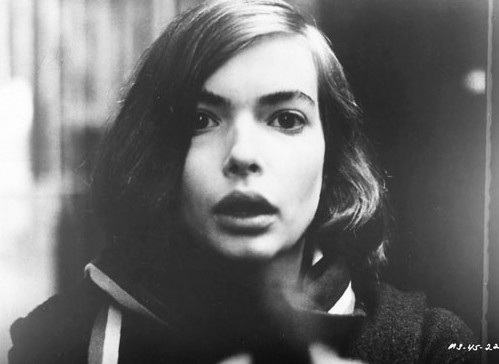 ★★★★★
★★★★★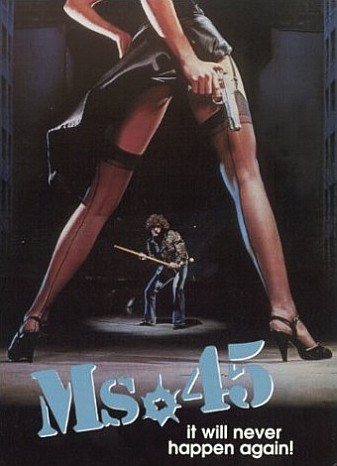
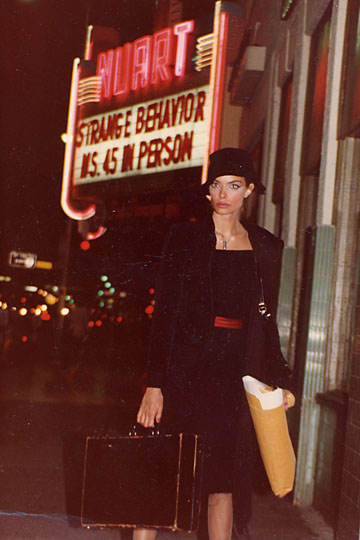 Hmm. While I can acknowledge the political subtext in Thana’s muteness [especially since it appears largely to be psychological, going by the last scene], I’m not quite sure how seriously I take this claim overall, given Ferrara actually plays one of the rapists, and a large percentage of the time is spent objectifying and fetishizing his lead actress, to the extent where Chris felt she looked like a supporting actress in a Robert Palmer video. Perhaps the most memorably instance of this is Thana, dressing up as a nun – but one that also wears stocking and suspenders – before heading out to a Halloween party. With her blood-red lipstick, she kisses each of the bullets before loading them into her gun, a sequence which tells us much about Ferrara’s repressed Catholicism [also apparently rampant in Lieutenant, where both Ferrara and Lund worked on the script], as well as paying homage to the other great New York street-sweeper, Travis Bickle from Taxi Driver.
Hmm. While I can acknowledge the political subtext in Thana’s muteness [especially since it appears largely to be psychological, going by the last scene], I’m not quite sure how seriously I take this claim overall, given Ferrara actually plays one of the rapists, and a large percentage of the time is spent objectifying and fetishizing his lead actress, to the extent where Chris felt she looked like a supporting actress in a Robert Palmer video. Perhaps the most memorably instance of this is Thana, dressing up as a nun – but one that also wears stocking and suspenders – before heading out to a Halloween party. With her blood-red lipstick, she kisses each of the bullets before loading them into her gun, a sequence which tells us much about Ferrara’s repressed Catholicism [also apparently rampant in Lieutenant, where both Ferrara and Lund worked on the script], as well as paying homage to the other great New York street-sweeper, Travis Bickle from Taxi Driver.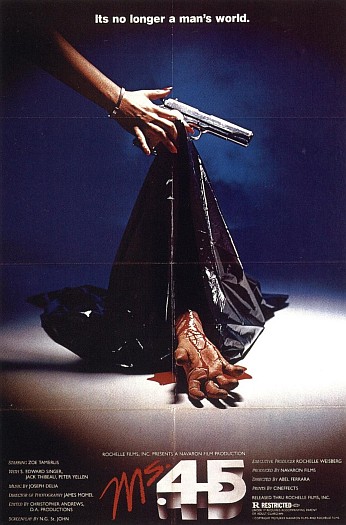 There are certainly holes in the plot logic. Where is Thana getting all the bullets from, and why is she such a crack-shot, despite presumably having never having handled a gun before? Yet these are in step with the pitch-black tongue-in-cheek humour the film contains: witness the long, rambling monologue inflicted on Thana by a guy she meets in a bar [her muteness making her the ultimate good listener]. I laughed like a
There are certainly holes in the plot logic. Where is Thana getting all the bullets from, and why is she such a crack-shot, despite presumably having never having handled a gun before? Yet these are in step with the pitch-black tongue-in-cheek humour the film contains: witness the long, rambling monologue inflicted on Thana by a guy she meets in a bar [her muteness making her the ultimate good listener]. I laughed like a 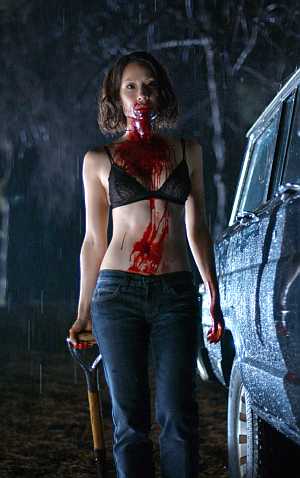 The main obstacle to this even reaching average is probably a first-half structure that is, for no readily apparent season, entirely fractured. Scenes appear entirely out of order, with no explanation: why is our heroine now waking up in a morgue? And the problem is, what the film has to offer is so pedestrian, you can’t be bothered to start putting the pieces together. Liu plays Sadie Blake, a journalist investigating the shady underground side of goth culture, who ends up finding a clan of vampires are on top of the food chain, just before becoming one of their victims. However, instead of taking her undeath lying down, she vows revenge and, accompanied by a rogue cop (Chiklis, you’ll not be surprised to learn), begins working her way up said food-chain.
The main obstacle to this even reaching average is probably a first-half structure that is, for no readily apparent season, entirely fractured. Scenes appear entirely out of order, with no explanation: why is our heroine now waking up in a morgue? And the problem is, what the film has to offer is so pedestrian, you can’t be bothered to start putting the pieces together. Liu plays Sadie Blake, a journalist investigating the shady underground side of goth culture, who ends up finding a clan of vampires are on top of the food chain, just before becoming one of their victims. However, instead of taking her undeath lying down, she vows revenge and, accompanied by a rogue cop (Chiklis, you’ll not be surprised to learn), begins working her way up said food-chain.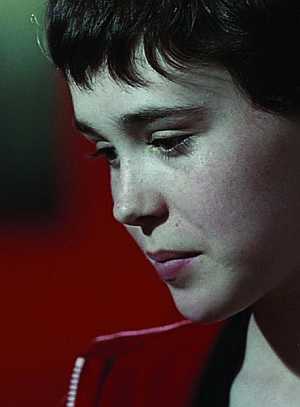 This is almost unbearably creepy, in two different directions: however, it’s almost impossible to discuss this film in any meaningful way without spoilers, so you have been warned. The danger of online predators is well-known, and when fourteen-year old Hayley (Page) agrees to meet photographer Jeff (Wilson), who is in his thirties, alarm bells are ringing. They reach a piercing level after she goes to his house, starts drinking vodka and flirting outrageously. However, the tables are abruptly turned: she’s spiked Jeff’s drink, and he wakes to find himself tied-up, and entirely at Hayley’s mercy. He soon finds out that’s a quality she is very definitely
This is almost unbearably creepy, in two different directions: however, it’s almost impossible to discuss this film in any meaningful way without spoilers, so you have been warned. The danger of online predators is well-known, and when fourteen-year old Hayley (Page) agrees to meet photographer Jeff (Wilson), who is in his thirties, alarm bells are ringing. They reach a piercing level after she goes to his house, starts drinking vodka and flirting outrageously. However, the tables are abruptly turned: she’s spiked Jeff’s drink, and he wakes to find himself tied-up, and entirely at Hayley’s mercy. He soon finds out that’s a quality she is very definitely 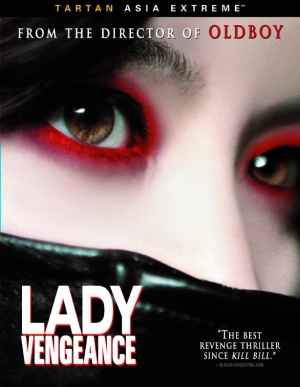 This film may need two viewings. First time up, I was irritated by an apparent lack of coherence – which was particularly annoying, since the non-linear storyline seemed almost completely superfluous. Second time round, it bothered me less though remained, perhaps deliberately, disorienting, and I still doubt the need for it. But the re-view left me better able to appreciate the great central idea, a chilling meditation on justice, revenge, the thin line between the two, and the effects on those who become involved. The final part of Park’s loose trilogy (after Sympathy for Mr. Vengeance and Oldboy) is the story of “kind-hearted Geum-ja” (Lee), who spends 13 years in prison, for the heinous murder of a young child. Except, she isn’t guilty, and spends the time forging alliances which will help with her new goal: revenge on the real perpetrator (Choi).
This film may need two viewings. First time up, I was irritated by an apparent lack of coherence – which was particularly annoying, since the non-linear storyline seemed almost completely superfluous. Second time round, it bothered me less though remained, perhaps deliberately, disorienting, and I still doubt the need for it. But the re-view left me better able to appreciate the great central idea, a chilling meditation on justice, revenge, the thin line between the two, and the effects on those who become involved. The final part of Park’s loose trilogy (after Sympathy for Mr. Vengeance and Oldboy) is the story of “kind-hearted Geum-ja” (Lee), who spends 13 years in prison, for the heinous murder of a young child. Except, she isn’t guilty, and spends the time forging alliances which will help with her new goal: revenge on the real perpetrator (Choi).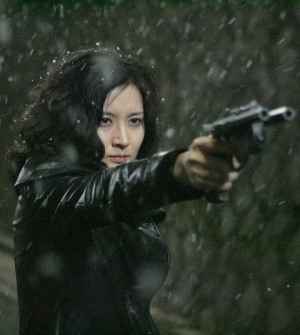 The pace is stately, rather than adrenalin-driven, yet there’s no denying its place here. Much credit to Lee for a great performance in a complex character, capable of huge sacrifice in her quest for redemption: she cuts off a finger in front of the victim’s parents, and has to be physically restrained from removing more. Yet it seems that her charity and good deeds, such as donating a kidney to a fellow prisoner, may be part of her vengeance. And then, when her goal is within grasp…she steps back to allow others, perhaps better-motivated, to take her place. Or is the opportunity that she offers a poisoned chalice? The questions asked have no easy answers; neither proponents of capital punishment, nor those opposed to it, will find it comfortable viewing. By the end, there are no victims left; everyone is guilty – to use the old Sex Pistols line, no-one is innocent.
The pace is stately, rather than adrenalin-driven, yet there’s no denying its place here. Much credit to Lee for a great performance in a complex character, capable of huge sacrifice in her quest for redemption: she cuts off a finger in front of the victim’s parents, and has to be physically restrained from removing more. Yet it seems that her charity and good deeds, such as donating a kidney to a fellow prisoner, may be part of her vengeance. And then, when her goal is within grasp…she steps back to allow others, perhaps better-motivated, to take her place. Or is the opportunity that she offers a poisoned chalice? The questions asked have no easy answers; neither proponents of capital punishment, nor those opposed to it, will find it comfortable viewing. By the end, there are no victims left; everyone is guilty – to use the old Sex Pistols line, no-one is innocent.